
Sapardi Djoko Damono was an Indonesian poet known for lyrical poems, and who was widely regarded as the pioneer of lyrical poetry in Indonesia. He died in South Tangerang, Banten on 19 July 2020 after a long illness.
Temenggong or Tumenggung is an old Malay and Javanese title of nobility, usually given to the chief of public security.

Indonesian literature is a term grouping various genres of South-East Asian literature.

Fuad Hassan was an Indonesian politician.
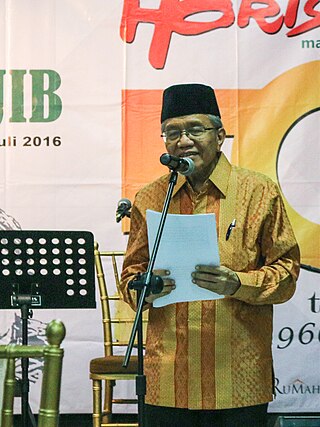
Taufiq Ismail is an Indonesian poet, activist and the editor of the monthly literary magazine Horison. Ismail figured prominently in Indonesian literature of the post-Sukarno period and is considered one of the pioneers of the "Generation of '66". He completed his education at the University of Indonesia. Before becoming active as a writer, he taught at the Institut Pertanian Bogor. In 1963, he signed the "Cultural Manifesto" as a document that opposed linking art to politics. This cost him his teaching position at the Institut.

Budi Darma was an Indonesian writer, essayist, and academic.

Hans Bague Jassin, better known as HB Jassin, was an Indonesian literary critic, documentarian, and professor. Born in Gorontalo to a bibliophilic petroleum company employee, Jassin began reading while still in elementary school, later writing published reviews before finishing high school. After a while working in the Gorontalo regent's office, he moved to Jakarta where he worked at the state publisher Balai Pustaka. After leaving the publisher, he attended the University of Indonesia and later Yale. Returning to Indonesia to be a teacher, he also headed Sastra magazine. Horison, a literary magazine, was started in July 1966 by Jassin and Mochtar Lubis as a successor to Sastra, and was edited by Taufiq Ismail, Ds. Muljanto, Zaini, Su Hok Djin, and Goenawan Mohamad. In 1971, Jassin was given a one-year prison sentence and a two-year probation period because as the editor of Sastra, he refused to reveal the identity of an anonymous writer who wrote a story which was considered by the court to be blasphemous.

Agam Wispi is an Indonesian poet.
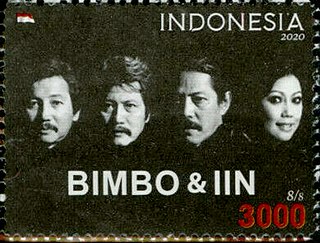
Bimbo, or formerly Trio Bimbo, is an Indonesian pop and religious vocal group.
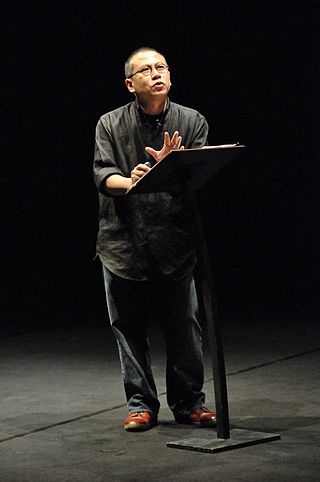
Nirwan Dewanto is an Indonesian poet, curator and cultural critic. He is also known for his depiction of Albertus Soegijapranata in the 2012 biopic Soegija.

Fifi Young was an Indonesian actress of mixed French and Chinese descent who acted in at least 86 films over her 34-year career.

Elly Joenara was an Indonesian film actress who later became a producer. She was the wife of producer Djamaluddin Malik.

Korrie Layun Rampan was an Indonesian novelist, short story writer, poet, literary critic, journalist, and politician.

Muhammad Ainun Nadjib, best known as Emha Ainun Nadjib or Cak Nun/Mbah Nun, is an Indonesian poet, essayist, kyai, ulama, and humanist. Born in Jombang, East Java, Nadjib began writing poetry while living in Yogyakarta, publishing his first collection in 1976. He became one of the city's predominant poets by the late 1980s, and by then had also began writing essays. He is the leader of the Kiai Kanjeng group, which stages dramas and musical performances on religious themes.
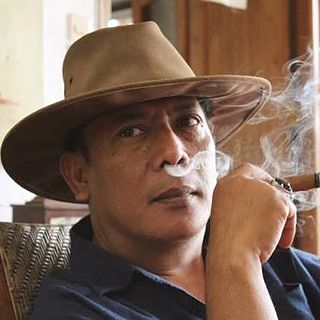
Sitok Srengenge is an Indonesian poet, actor, and dramatist. Born Sitok Sunarto in Purwodadi, Central Java, he became interested in literature at a young age and was heavily influenced by his village's strong oral tradition. When he moved to Jakarta to complete his university studies, he became involved with the Bengkel Teater under Rendra. Sitok remained with the company for almost a decade, appearing in several plays as he refined his literary style. His first poetry collection, Persetubuhan Liar, was published in 1992.

Marlia Hardi was an Indonesian actress who was active from 1950s to 1980s. Born in the Magelang, she took to the stage in the 1940s before moving to Jakarta in 1949. Two years later she made her feature film debut in Untuk Sang Merah Putih. Over the next two decades she appeared in over seventy films, became recognized for her depictions of mothers, and received the Citra Award for Best Supporting Actress. Despite her productiveness, however, she sank into debt and committed suicide at the age of fifty-eight.

Darussalam was an Indonesian actor who appeared in more than seventy films in his forty-year career. Born in Bengkulu, he studied to be nurse before migrating to theatre during the Japanese occupation of the Dutch East Indies, marrying Netty Herawaty while with the troupe Irama Masa. The couple spent the remainder of the occupation and the ensuing revolution touring the archipelago with a number of troupes. In 1949, Darussalam and Herawaty made their feature film debut in Fred Young's Saputangan, appearing in seven further Young productions before migrating to Djamaluddin Malik's Persari. During their eight years with the company, Darussalam and Herawaty travelled to the Philippines and Singapore and found popularity among audiences, though Darussalam remained in his wife's shadow.
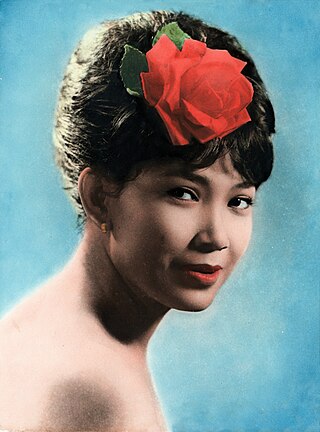
Marjolein Tambayong, better known by her stage name Rima Melati or by her nickname Lientje, was an Indonesian actress, model, and singer. She appeared in close to one hundred feature films, including works by Wim Umboh, Sjumandjaja, and Teguh Karya. She received multiple awards, including a PWI Award for Best Actress for Noda Tak Berampun, a Citra Award for Best Leading Actress for Intan Berduri, and five nominations for the Citra Award for Best Supporting Actress.

Police-General (Ret.) Tan Sri Budi Gunawan PSM is an Indonesian high ranking police officer who is the Chief of the Indonesian State Intelligence Agency (BIN) since September 9, 2016, and is also the General Chairman of the Indonesian E-Sports Executive Board. He previously served as Deputy Chief of Indonesian National Police accompanying National Police Chief Badrodin Haiti and Tito Karnavian. He is the second member of the police after Sutanto to lead the State Intelligence Agency.
Essay Poetry(Indonesian: Puisi Esai) combines two types of thinking, namely poetry and essays. The principle of essay poetry was first proposed and initiated by Denny Januar Ali and creatively manifested in 2012 through a book entitled "In the Name of Love." In total, around 100 books essay poetry have been published by Indonesian and foreign poets. Then in 2020, essay poetry officially became a new word in the Official Indonesian Dictionary. A written work can be called essay poetry if it meets four criteria. Firstly, it must touch the reader's heart by exploring the inner, personal experience as well as express the inner psychological aspects of man in a concrete manner. Secondly, it must portray mankind in a social context or in an authentic historical event. It should not evade the existence of relevant research that comprehends the social reality attached to an event. It should also not avoid using footnotes, since their use is a central aspect of this medium. Thirdly, it must be written in language that is simple enough to be read by the general public, yet still be elegantly arranged. Fourthly, it must depict a certain social dynamic or describe a dynamic that involves the character of a perpetrator. The composition of an essay poem should not elude or preclude the possibility that it becomes lengthy and divided into many short chapters.

















